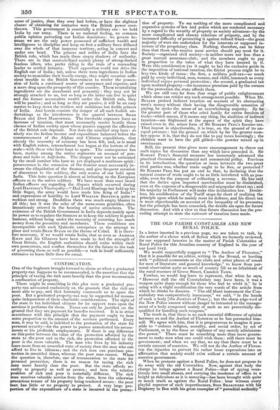CONFISCATION.
ONE of the bugbears brought forward to alarm us when a graduated property-tax happens to be recommended, is the assertion that the principle of taxing the rich more heavily than the poor recommends a confiscation of property.
There might be something in this plea were a graduated pro- perty-tax advocated exclusively on the grounds that the rich are more able to pay, and that humanity commands us to spare the poor. But a graduated property-tax may be supported for reasons quite independent of these charitable considerations. The right of the state to tax individual citizens for its support rests upon the services it performs for them. Taxes can only be justified on the ground that they are payment for benefits received. It is in strict accordance with this principle that the payment ought to bear some proportion to the amount of the services performed. Every man, it may be said, is indebted to the protection of the state for personal security—for the power to pursue unmolested his amuse- ments or his profitable employments. If there is any difference on this point between the value of the protection afforded by the state to the poor and to the rich, the protection afforded to the poor is the more valuable. The man who lives by his industry loses more from an unsettled state of society than the man who can afford to live in idleness; and the rich man can purchase pro- tection in unsettled times, whereas the poor man cannot. When the question is, therefore, one of remuneration to the state for personal protection, there is no reason for taxing the rich man more heavily than the poor. But the state affords se- curity to property as well as person • and here the relative position of rich and poor is materii:lly different. The rich man receives valuable service from the state, from the otherwise precarious tenure of his property being rendered secure : the poor man has little or no property to protect. A very large pro- portion of the expenditure of a state is incurred in the protec-
tion of property. To say nothing of the more complicated and expensive systems of law and police which are rendered necessary by a regard to the security of property as society advances—by the more complicated and elusory relations of property, and by the increased difficulty of protecting it against refined fraud—the great majority of wars are undertaken for the interests or supposed in- terests of the proprietary class. Nothing, therefore, can be fairer than that those who receive most service should pay most for it. Society—organized civil society—is neither more nor less than a great mutual assurance-club ; and the members ought to pay in proportion to the value of what they have insured in it. Were this consideration (as it ought to be) the exclusive guide in the imposition of national taxation, the fairest process might be to levy two kinds of taxes : the first, a uniform poll-tax—so much paid by every individual, man, woman, and child, inasmuch as every individual enjoys personal protection ; the second, a graduated tax upon realized property—the insurance-premium paid by the owners for the protection the state affords them.
We are still very far from that stage of public enlightenment which alone can render any such arrangement possible. When Mr. BULLER praised indirect taxation on account of its abstracting men's money without their having the disagreeable sensation of paying, he spoke the sense of an overwhelming majority. By far
the greater part of those who cried lustily for entire freedom of trade--which means, if it means any thing, the abolition of indirect taxation—are frightened at the aspect of the spirit they have raised even in the minor form of Sir ROBERT PEEL'S Income-tax. That impost is objectionable, it is true, on the ground of its un- equal pressure : but the ground on which by far the greater num- ber oppose it is, that they do not like to pay taxes knowingly ; the children want to have the pill gilded—the powder mixed up in sweetmeats.
Still, the present time gives more encouragement to throw out such topics for discussion than any which have preceded it. Sir ROBERT PEEL'S financial measure has immensely advanced the practical discussion of financial and commercial policy. Previous to its introduction, the question at issue between the two great rival parties was, whether trade ought to be free, or protected ? Sir ROBERT PEEL has put an end to that, by declaring that the natural course of trade ought to be as little interfered with as pos- sible, even for the purpose of collecting a revenue. He has said that the duties upon imported merchandise must be diminished, even at the expense of a disagreeable and unpopular direct tax ; and his majority in Parliament will make this declaration law. Doubt- less, his modification of the Tariff stops far short of realizing the principle upon which he mainly rests its defence, and his direct tax
is most objectionable on account of the inequality of its pressure; but the principle has been conceded, the details are open for future discussion. And with a view to that future discussion has the pre- ceding attempt to state the rationale of taxation been made.


























 Previous page
Previous page